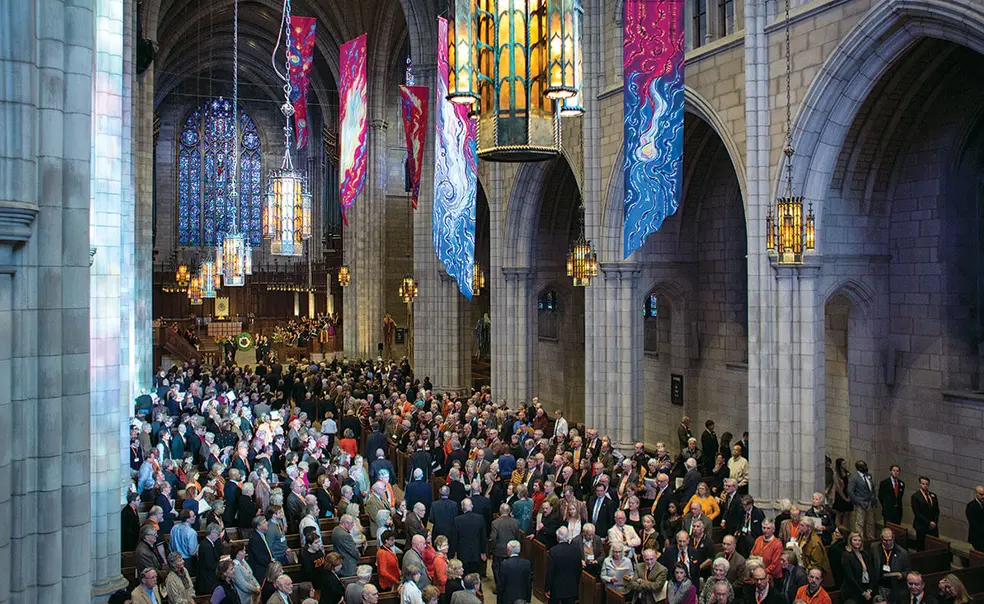Alumni Day: Reflections on Service
Honorees Milley ’80 and Heckman *71 discuss military, economic inequality
Social mobility and service to the nation were the major themes of Alumni Day talks by economics professor James Heckman *71, winner of the James Madison Medal, and the chief of staff of the U.S. Army, Gen. Mark Milley ’80, who received the Woodrow Wilson Award. More than 1,000 alumni attended the event Feb. 20, an unusually spring-like winter day, and many flocked to Nassau Street afterward in reunion jackets.
Joking that he was “in the half of the class that made the top half possible,” Milley noted that the importance of service to one’s country was instilled in him at an early age by his parents, who both served in World War II — his father as a Marine, his mother as a Navy nurse. He often is asked why a Princeton graduate would choose a career in the military, he said. “The idea that rang true for all of my life was that I wanted to help others in whatever I decided to do, and to be part of something greater than myself, and to give meaning to ‘Princeton in the nation’s service,’” he responded.
There was little formal discussion about the controversy surrounding Woodrow Wilson 1879’s legacy, though Milley alluded to Wilson’s “challenging personality” and President Eisgruber ’83 encouraged alumni to share their opinions about the subject online. An open meeting for alumni and the campus community on the topic was held Feb. 19 (see page 10).
Heckman, a professor at the University of Chicago, won the Nobel Prize in economics in 2000 for developing a method to correct bias that results from using an unrepresentative survey sample of data. He recalled mentors at Princeton who taught him it was critical to study important social questions. His work examines income distribution, the economics of discrimination, and the effects of education on earnings and health.
Alumni and faculty also attended the Service of Remembrance and panels on topics including global health and media coverage of the 2016 election.
Princeton’s Top Student Prizes
The two winners of the PYNE HONOR PRIZE, the University’s top undergraduate award, are:
JAMES AGOLIA ’16, chemistry. He won the Shapiro Prize for Academic Excellence twice and plans to pursue a career as a surgeon and scientist. ANDREW NELSON ’16, German. He won the Arthur Liman Fellowship in Public Interest Law and intends to work in policy advocacy and public-interest law.
There were four winners of the University’s highest honor for graduate students, the JACOBUS FELLOWSHIP, which supports the final year of study:
JOSHUA BENNETT, English. He plans to become a professor, focusing on the black literary tradition, and to continue his career as a poet, performance artist, and arts educator. KELLEN FUNK, history. A lawyer, Funk will begin a series of clerkships in the federal courts after completing his dissertation. CARLEE JOE-WONG ’12, mathematics. A co-founder of the mobile-data company Datami, she plans to continue studying the Internet as a professor. RAJESH RANGANATH, computer science. As a professor, he will address problems in clinical medicine by developing new statistical methodologies.
View videos about the 2016 Jacobus Fellows
Alumni Awards
THE CLASS OF 1965 has received the Class of 1926 Trophy for raising $7,416,459 in celebration of its 50th reunion. (In previous years the trophy has been awarded at Alumni Day, but it is now given in the fall.) The Harold H. Helm ’20 Award for sustained service to Annual Giving went to JOHN P. LAVELLE JR. ’85 of Bryn Mawr, Pa.












No responses yet